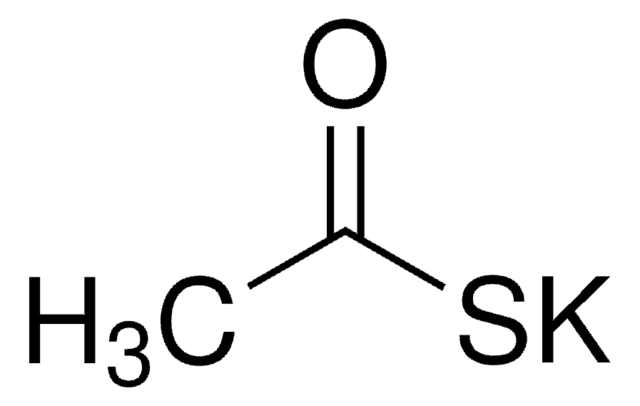13478
Sodium thiocyanate
≥97.5% (calc. to the dried substance)
Sinónimos:
Sodium isothiocyanate, Sodium rhodanate, Sodium rhodanide, Sodium sulfocyanate
About This Item
Productos recomendados
Ensayo
≥97.5% (calc. to the dried substance)
impurezas
≤0.002% heavy metals (as Pb)
pérdida
≤2% loss on drying, 105 °C
mp
287 °C (dec.) (lit.)
trazas de anión
chloride (Cl-): ≤500 mg/kg
sulfate (SO42-): ≤300 mg/kg
trazas de catión
As: ≤10 mg/kg
Fe: ≤5 mg/kg
cadena SMILES
[Na]SC#N
InChI
1S/CHNS.Na/c2-1-3;/h3H;/q;+1/p-1
Clave InChI
VGTPCRGMBIAPIM-UHFFFAOYSA-M
¿Está buscando productos similares? Visita Guía de comparación de productos
Palabra de señalización
Danger
Frases de peligro
Consejos de prudencia
Clasificaciones de peligro
Acute Tox. 4 Dermal - Acute Tox. 4 Inhalation - Acute Tox. 4 Oral - Aquatic Chronic 3 - Eye Dam. 1
Riesgos supl.
Código de clase de almacenamiento
13 - Non Combustible Solids
Clase de riesgo para el agua (WGK)
WGK 1
Punto de inflamabilidad (°F)
Not applicable
Punto de inflamabilidad (°C)
Not applicable
Equipo de protección personal
dust mask type N95 (US), Eyeshields, Gloves
Elija entre una de las versiones más recientes:
¿Ya tiene este producto?
Encuentre la documentación para los productos que ha comprado recientemente en la Biblioteca de documentos.
Nuestro equipo de científicos tiene experiencia en todas las áreas de investigación: Ciencias de la vida, Ciencia de los materiales, Síntesis química, Cromatografía, Analítica y muchas otras.
Póngase en contacto con el Servicio técnico










